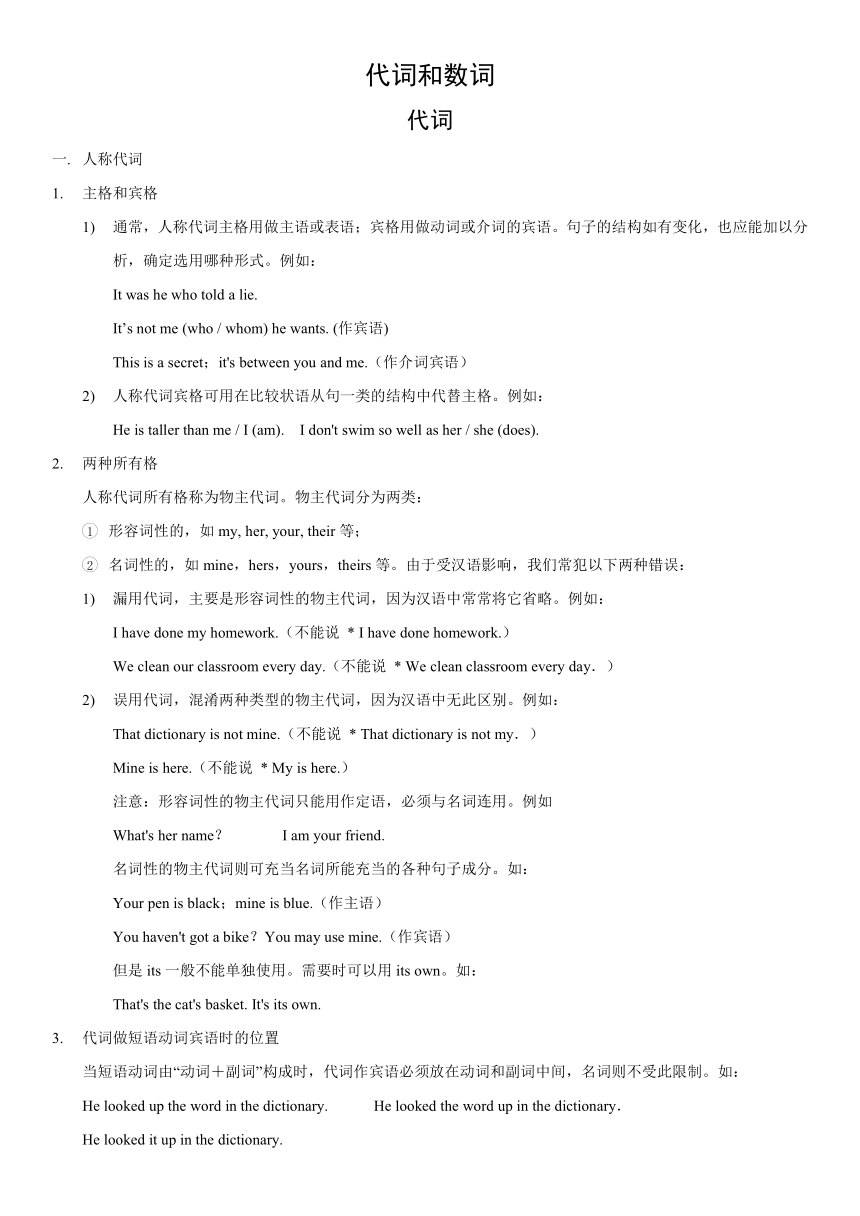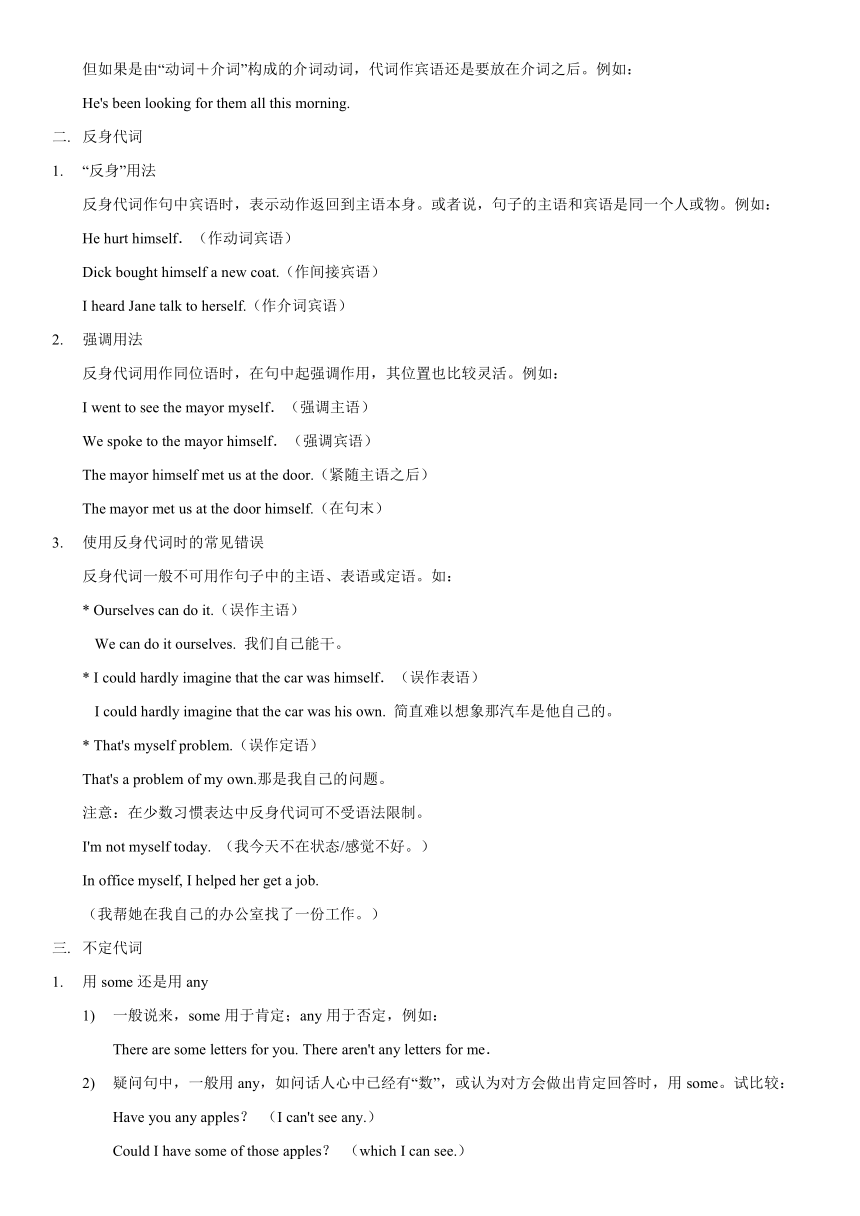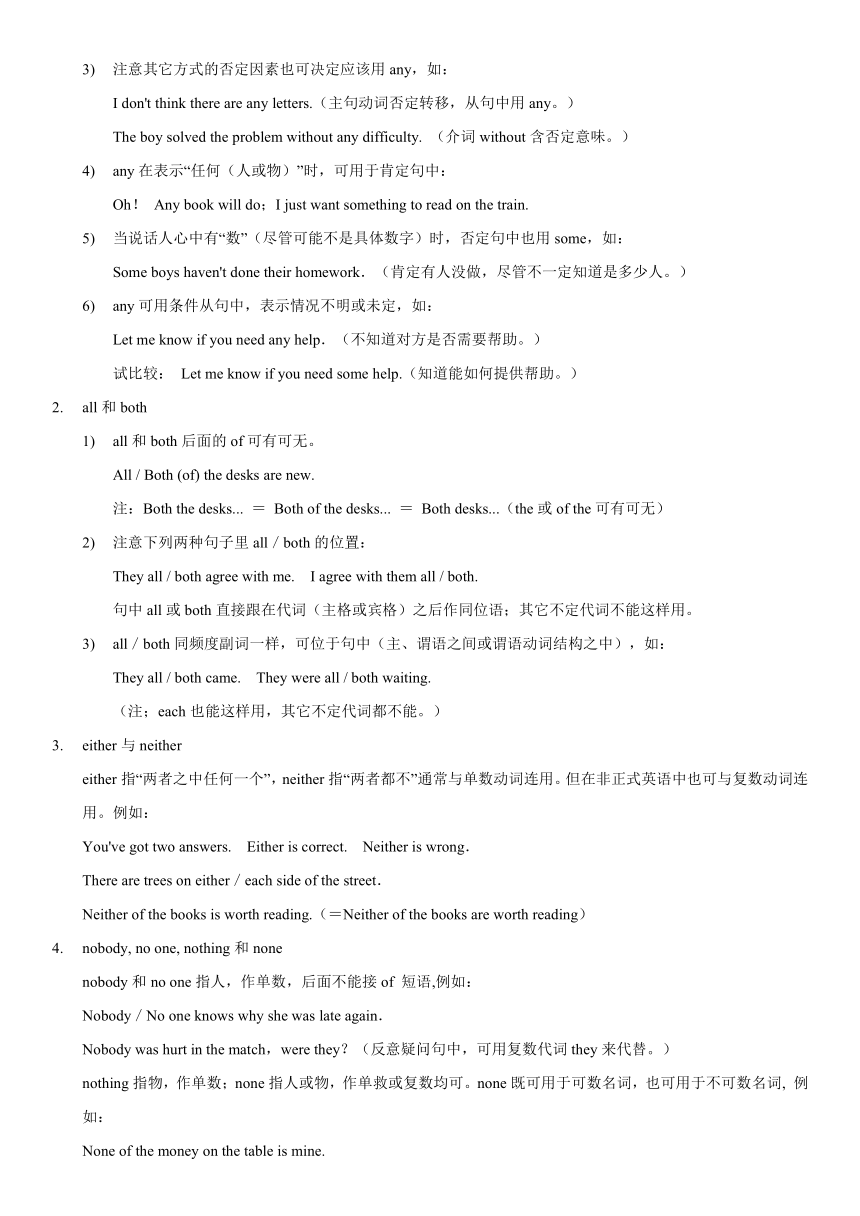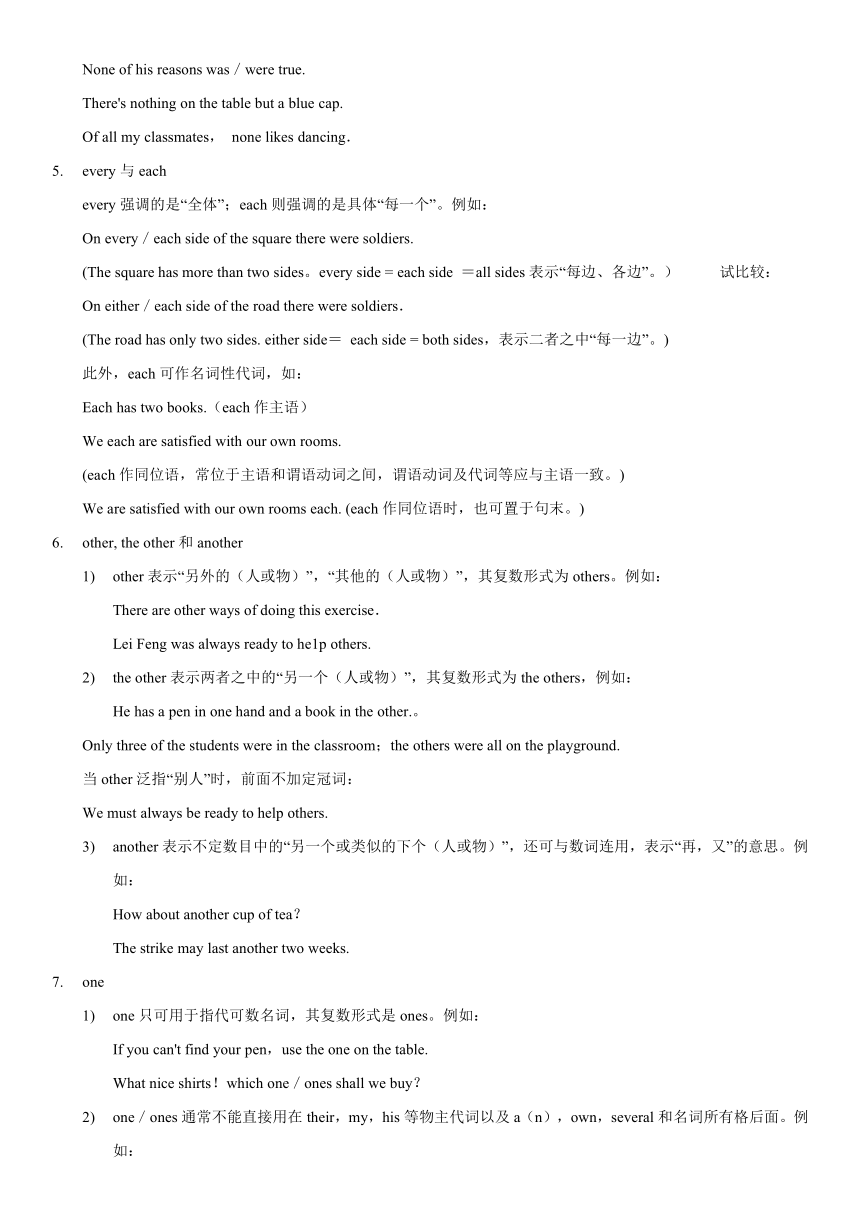备战2018高考英语一轮复习专题讲解(词法部分)代词和数词
文档属性
| 名称 | 备战2018高考英语一轮复习专题讲解(词法部分)代词和数词 |  | |
| 格式 | zip | ||
| 文件大小 | 129.2KB | ||
| 资源类型 | 教案 | ||
| 版本资源 | 通用版 | ||
| 科目 | 英语 | ||
| 更新时间 | 2017-07-22 10:14:20 | ||
图片预览




文档简介
代词和数词
代词
人称代词
主格和宾格
通常,人称代词主格用做主语或表语;宾格用做动词或介词的宾语。句子的结构如有变化,也应能加以分析,确定选用哪种形式。例如:
It
was
he
who
told
a
lie.
It’s
not
me
(who
/
whom)
he
wants.
(作宾语)
This
is
a
secret;it's
between
you
and
me.(作介词宾语)
人称代词宾格可用在比较状语从句一类的结构中代替主格。例如:
He
is
taller
than
me
/
I
(am).
I
don't
swim
so
well
as
her
/
she
(does).
两种所有格
人称代词所有格称为物主代词。物主代词分为两类:
形容词性的,如my,
her,
your,
their等;
名词性的,如mine,hers,yours,theirs等。由于受汉语影响,我们常犯以下两种错误:
漏用代词,主要是形容词性的物主代词,因为汉语中常常将它省略。例如:
I
have
done
my
homework.(不能说
I
have
done
homework.)
We
clean
our
classroom
every
day.(不能说
We
clean
classroom
every
day.)
误用代词,混淆两种类型的物主代词,因为汉语中无此区别。例如:
That
dictionary
is
not
mine.(不能说
That
dictionary
is
not
my.)
Mine
is
here.(不能说
My
is
here.)
注意:形容词性的物主代词只能用作定语,必须与名词连用。例如
What's
her
name?
I
am
your
friend.
名词性的物主代词则可充当名词所能充当的各种句子成分。如:
Your
pen
is
black;mine
is
blue.(作主语)
You
haven't
got
a
bike?You
may
use
mine.(作宾语)
但是its一般不能单独使用。需要时可以用its
own。如:
That's
the
cat's
basket.
It's
its
own.
代词做短语动词宾语时的位置
当短语动词由“动词+副词”构成时,代词作宾语必须放在动词和副词中间,名词则不受此限制。如:
He
looked
up
the
word
in
the
dictionary.
He
looked
the
word
up
in
the
dictionary.
He
looked
it
up
in
the
dictionary.
但如果是由“动词+介词”构成的介词动词,代词作宾语还是要放在介词之后。例如:
He's
been
looking
for
them
all
this
morning.
反身代词
“反身”用法
反身代词作句中宾语时,表示动作返回到主语本身。或者说,句子的主语和宾语是同一个人或物。例如:
He
hurt
himself.(作动词宾语)
Dick
bought
himself
a
new
coat.(作间接宾语)
I
heard
Jane
talk
to
herself.(作介词宾语)
强调用法
反身代词用作同位语时,在句中起强调作用,其位置也比较灵活。例如:
I
went
to
see
the
mayor
myself.(强调主语)
We
spoke
to
the
mayor
himself.(强调宾语)
The
mayor
himself
met
us
at
the
door.(紧随主语之后)
The
mayor
met
us
at
the
door
himself.(在句末)
使用反身代词时的常见错误
反身代词一般不可用作句子中的主语、表语或定语。如:
Ourselves
can
do
it.(误作主语)
We
can
do
it
ourselves.
我们自己能干。
I
could
hardly
imagine
that
the
car
was
himself.(误作表语)
I
could
hardly
imagine
that
the
car
was
his
own.
简直难以想象那汽车是他自己的。
That's
myself
problem.(误作定语)
That's
a
problem
of
my
own.那是我自己的问题。
注意:在少数习惯表达中反身代词可不受语法限制。
I'm
not
myself
today.
(我今天不在状态/感觉不好。)
In
office
myself,
I
helped
her
get
a
job.
(我帮她在我自己的办公室找了一份工作。)
不定代词
用some还是用any
一般说来,some用于肯定;any用于否定,例如:
There
are
some
letters
for
you.
There
aren't
any
letters
for
me.
疑问句中,一般用any,如问话人心中已经有“数”,或认为对方会做出肯定回答时,用some。试比较:
Have
you
any
apples?
(I
can't
see
any.)
Could
I
have
some
of
those
apples?
(which
I
can
see.)
注意其它方式的否定因素也可决定应该用any,如:
I
don't
think
there
are
any
letters.(主句动词否定转移,从句中用any。)
The
boy
solved
the
problem
without
any
difficulty.
(介词without含否定意味。)
any在表示“任何(人或物)”时,可用于肯定句中:
Oh!
Any
book
will
do;I
just
want
something
to
read
on
the
train.
当说话人心中有“数”(尽管可能不是具体数字)时,否定句中也用some,如:
Some
boys
haven't
done
their
homework.(肯定有人没做,尽管不一定知道是多少人。)
any可用条件从句中,表示情况不明或未定,如:
Let
me
know
if
you
need
any
help.(不知道对方是否需要帮助。)
试比较:
Let
me
know
if
you
need
some
help.(知道能如何提供帮助。)
all和both
all和both后面的of可有可无。
All
/
Both
(of)
the
desks
are
new.
注:Both
the
desks...
=
Both
of
the
desks...
=
Both
desks...(the或of
the可有可无)
注意下列两种句子里all/both的位置:
They
all
/
both
agree
with
me.
I
agree
with
them
all
/
both.
句中all或both直接跟在代词(主格或宾格)之后作同位语;其它不定代词不能这样用。
all/both同频度副词一样,可位于句中(主、谓语之间或谓语动词结构之中),如:
They
all
/
both
came.
They
were
all
/
both
waiting.
(注;each也能这样用,其它不定代词都不能。)
either与neither
either指“两者之中任何一个”,neither指“两者都不”通常与单数动词连用。但在非正式英语中也可与复数动词连用。例如:
You've
got
two
answers.
Either
is
correct.
Neither
is
wrong.
There
are
trees
on
either/each
side
of
the
street.
Neither
of
the
books
is
worth
reading.(=Neither
of
the
books
are
worth
reading)
nobody,
no
one,
nothing和none
nobody和no
one指人,作单数,后面不能接of
短语,例如:
Nobody/No
one
knows
why
she
was
late
again.
Nobody
was
hurt
in
the
match,were
they?(反意疑问句中,可用复数代词they来代替。)
nothing指物,作单数;none指人或物,作单救或复数均可。none既可用于可数名词,也可用于不可数名词,
例如:
None
of
the
money
on
the
table
is
mine.
None
of
his
reasons
was/were
true.
There's
nothing
on
the
table
but
a
blue
cap.
Of
all
my
classmates,
none
likes
dancing.
every与each
every强调的是“全体”;each则强调的是具体“每一个”。例如:
On
every/each
side
of
the
square
there
were
soldiers.
(The
square
has
more
than
two
sides。every
side
=
each
side
=all
sides表示“每边、各边”。)
试比较:
On
either/each
side
of
the
road
there
were
soldiers.
(The
road
has
only
two
sides.
either
side=
each
side
=
both
sides,表示二者之中“每一边”。)
此外,each可作名词性代词,如:
Each
has
two
books.(each作主语)
We
each
are
satisfied
with
our
own
rooms.
(each作同位语,常位于主语和谓语动词之间,谓语动词及代词等应与主语一致。)
We
are
satisfied
with
our
own
rooms
each.
(each作同位语时,也可置于句末。)
other,
the
other和another
other表示“另外的(人或物)”,“其他的(人或物)”,其复数形式为others。例如:
There
are
other
ways
of
doing
this
exercise.
Lei
Feng
was
always
ready
to
he1p
others.
the
other表示两者之中的“另一个(人或物)”,其复数形式为the
others,例如:
He
has
a
pen
in
one
hand
and
a
book
in
the
other.。
Only
three
of
the
students
were
in
the
classroom;the
others
were
all
on
the
playground.
当other泛指“别人”时,前面不加定冠词:
We
must
always
be
ready
to
help
others.
another表示不定数目中的“另一个或类似的下个(人或物)”,还可与数词连用,表示“再,又”的意思。例如:
How
about
another
cup
of
tea?
The
strike
may
last
another
two
weeks.
one
one只可用于指代可数名词,其复数形式是ones。例如:
If
you
can't
find
your
pen,use
the
one
on
the
table.
What
nice
shirts!which
one/ones
shall
we
buy?
one/ones通常不能直接用在their,my,his等物主代词以及a(n),own,several和名词所有格后面。例如:
His
knife
seems
sharper
than
mine.(不能用
my
one代替mine)
They
don't
like
this
town;they
want
very
much
to
go
back
to
their
own.(不能用
their
own
one代替their
own
或
their
own
country)
但是,当one/ones前面还带有形容词时,则例外。如:
Have
you
any
knives?I
need
a
sharp
one.
My
old
dictionary
isn't
as
good
as
John's
new
one.
the/this/that
one与that:
that可以指代不可数名词,而one不能。如:
The
weather
in
Wuhan
is
much
warmer
than
that
in
Tianjing.
(that不能用the
one取代)
that后面常接of短语,例如:
This
dictionary
is
more
expensive
than
that
one.(that
one=that
dictionary.
one一般不省略)
The
window
of
your
room
is
much
bigger
than
that
of
mine.(that=the
window,它后面有of短语,一般不用the
one替代)
有时候the
one和that可以互相取代,如:
The
gold
ring
is
in
that
box
---
the
one(=that)with
the
key
in
the
lock.
one可以泛指人,相当于you,we,people,其所有格为one's。例如:
One
should
do
one's/his
duty.
数
词
拼法需要当心的序数词
在first,second和third之后的序数词都由基数词加
-th构成,但要注意以下拼法略有变化:
twentieth,
thirtieth,
fortieth…
fifth
eighth
ninth
twelfth..
序号的表示
基数词放在名词之后,通常写作阿拉伯数,如:
page
4(P.4)读作page
four
Room301读作room
three
O
[ou]
one
Tel
No.864412读作telephone
number
eight
six
double
four
one
two
序数词放在名词之前,通常前面要加定冠词.如:
the
Eighth
Lesson(=Lesson
Eight)
the
First
Middle
School(=Middle
School
No.
1)
数词后面的名词用单数还是用复数
表示计量时,基数词后面的名词用复数形式,但是在带有数字的复合名词(常用作定语)里,名词只用单数形式。试比较:
They
baby
is
only
six
moths
old.
This
is
a
six-moth-old
baby.
I
have
five
pounds.
I
have
a
five-pound
note.
hundreds
/
thousands
/
millions
of
+
名词复数
hundred,
thousand和million后加
–s与of连用,表示“数百、数千、数百万”。
He
has
bought
hundreds
of
books
this
year.
Thousands
of
seagulls
arrived
to
help
the
farmers
save
their
crops.
dozen和score
用法与hundred,
thousand,
million基本相似dozens
of和scores
of均表示“几十个”。但有以下几点区别:
在接具体名词复数时dozen后不加of,而score常与of连用。如:
two
dozen
books
two
score
(of)books
若名词被限定词限定,dozen后应加of,接宾格代词亦如此。
three
dozen
of
those
(the,
my,
those)
books
three
dozen
of
them
表示不定数量的常用单词和词组
这些单词或词组与名词的搭配关系见下表
用于可数名词
用于不可数名词
用于可数名词和不可数名词
a
bit
of
(a)
few
(a)
little
all
fewer
less
plenty
of
(the)
fewest
(the)
least
a
lot
of;
lots
of
a
(great)
number
of
a
great
deal
(amount)
of
enough
many
much
more;
most
several
some;
any
hundreds
of
dozens
of
(a)
few
和(a)
little
a
few和a
little与some的意思较接近,表示“有几个;有一点”。few和little则表示“几乎没有(=
almost
none)”的意思。试比较:
She
doesn’t
seem
very
friendly;
she
has
few
friends。
(not
many
friends)
Although
she
has
been
here
only
a
short
time,
she
has
made
a
few
friends.
(some
friends)
I
can’t
make
a
pie
because
there
is
little
sugar.
(not
much
sugar)
There
is
a
little
sugar
for
your
coffee.
(some
sugar)
用fewer还是用less
从理论上讲few的比较级形式fewer用于复数名数前;little的比较级形式less用于不可
数名词前,但是在现代英语中,尤其是在非正式场合下,也常用less代替fewer;例如:
If
on1y
there
were
fewer/less
holes
in
the
roof?
many
+
a
+
名词单数
many
a后接可数名词单数形式,表示“好些;许多”,多用于书面语或演讲中。
Many
a
young
man
has
had
such
a
chance.
(动词用has)
many
a
time则看作是固定词组,表示“多次”。
That’s
happened
to
me
many
a
time.
巩固训练
The
coat
is
not
mine.
It
must
be
________.
A.
someone
else’s
B.
someone’s
else
C.
someone
else
D.
someone’s
else’s
The
question
is
whether
________
will
volunteer
(自愿)
to
do
the
work
unpaid.
A.
one
B.
anyone
C.
someone
D.
none
He
lives
in
that
________
house.
A.
green
big
wooden
B.
big
green
wooden
C.
wooden
big
green
D.
wooden
green
big
We
should
point
out
________
shortcomings.
A.
each
other
B.
each
others
C.
each
other’s
D.
each’s
other
Don’t
leave
________
to
tomorrow.
A.
today’s
work
B.
today
work
C.
work
of
today
D.
todays’
work
The
teacher
asked
________
to
have
a
dialogue
in
English.
A.
she
and
I
B.
her
and
I
C.
her
and
me
D.
she
and
me
The
Parkers
brought
a
new
house
but
________
will
need
a
lot
of
work
before
they
can
move
in.
A.
they
B.
it
C.
one
D.
which
I
think
________
important
to
learn
English
well.
A.
it
B.
this
C.
that
D.
one
He
is
a
friend
of
________.
A.
me
B.
my
C.
I
D.
mine
One
should
support
________
family.
A.
one
B.
one’s
C.
their
D.
her
—
Which
do
you
like
to
have,
fish
or
chicken
—
I’m
afraid
________
will
do.
A.
either
B.
neither
C.
none
D.
both
The
two
shirts
are
nice.
I
will
take
________
for
a
change.
A.
both
of
them
B.
either
of
them
C.
all
of
them
D.
they
all
The
home
improvements
have
taken
what
little
my
spare
time.
A.
from
B.
of
C.
in
D.
at
They
all
don’t
like
being
treated
like
that.
The
sentence
means
________.
A.
All
of
them
like
being
treated
like
that.
B.
None
of
them
like
being
treated
like
that.
C.
Not
all
of
them
like
being
treated
like
that.
D.
No
one
likes
being
treated
like
that.
These
two
pairs
of
shoes
don’t
fit
me.
I’d
like
to
see
________
pair.
A.
one
B.
the
other
C.
either
D.
another
He
went
there
to
see
what
was
the
matter
for
________.
A.
he
B.
him
D.
much
D.
himself
He
told
me
he
couldn’t
walk
________
far.
A.
it
B.
that
C.
more
D.
any
Are
you
feeling
________
better
A.
some
B.
no
C.
more
D.
any
My
old
TV
set
broke
down.
I
have
to
buy
a
new
________.
A.
it
B.
that
C.
one
D.
this
The
climate
here
is
hotter
than
________
of
Beijing.
A.
one
B.
it
C.
that
D.
those
We
need
________
five
people
to
finish
the
work
in
time.
A.
other
B.
another
C.
some
D.
any
—
Can
I
have
the
other
egg
—
I’m
afraid
not.
Tom
has
had
________.
A.
it
B.
one
C.
that
D.
this
Was
________
in
the
First
World
War
that
he
was
killed
A.
it
B.
one
C.
some
D.
that
I
asked
all
my
classmates
the
same
question,
and
they
________
gave
me
a
different
answer.
A.
each
B.
all
C.
every
D.
both
________
of
the
students
passed
the
exam.
A.
Two-thirds
B.
Two-third
C.
Second-three
D.
Second-threes
My
father
began
to
learn
Russian,
when
he
was
already
in
________.
A.
the
1920,
the
sixties
B.
1920s,
his
sixty
C.
the
1920s,
his
sixties
D.
the
1920’s,
his
sixty
Although
he
has
failed
six
times,
he
will
try
________
time.
A.
a
seventh
B.
the
seventh
C.
seventh
D.
seven
Shortly
after
the
accident,
two
________
police
were
sent
to
the
spot
to
keep
order.
A.
dozen
of
B.
dozens
C.
dozen
D.
dozens
of
The
hero
of
the
story
is
an
artist
in
his
________.
A.
thirtieth
B.
thiety
C.
thirty’s
C.
thirties
$2.95
may
be
read
as
________
or
two
ninety
five.
A.
two
dollar
ad
ninety
five
cents
B.
two
dollars
and
ninety
five
cent
C.
two
dollars
and
ninety
five
cents
D.
two
dollar
and
ninety
five
cent
1—10.
ABBCA
CBADB
11—20.
BABCD
DBDCC
21—30.
BAAAA
CACCC
代词
人称代词
主格和宾格
通常,人称代词主格用做主语或表语;宾格用做动词或介词的宾语。句子的结构如有变化,也应能加以分析,确定选用哪种形式。例如:
It
was
he
who
told
a
lie.
It’s
not
me
(who
/
whom)
he
wants.
(作宾语)
This
is
a
secret;it's
between
you
and
me.(作介词宾语)
人称代词宾格可用在比较状语从句一类的结构中代替主格。例如:
He
is
taller
than
me
/
I
(am).
I
don't
swim
so
well
as
her
/
she
(does).
两种所有格
人称代词所有格称为物主代词。物主代词分为两类:
形容词性的,如my,
her,
your,
their等;
名词性的,如mine,hers,yours,theirs等。由于受汉语影响,我们常犯以下两种错误:
漏用代词,主要是形容词性的物主代词,因为汉语中常常将它省略。例如:
I
have
done
my
homework.(不能说
I
have
done
homework.)
We
clean
our
classroom
every
day.(不能说
We
clean
classroom
every
day.)
误用代词,混淆两种类型的物主代词,因为汉语中无此区别。例如:
That
dictionary
is
not
mine.(不能说
That
dictionary
is
not
my.)
Mine
is
here.(不能说
My
is
here.)
注意:形容词性的物主代词只能用作定语,必须与名词连用。例如
What's
her
name?
I
am
your
friend.
名词性的物主代词则可充当名词所能充当的各种句子成分。如:
Your
pen
is
black;mine
is
blue.(作主语)
You
haven't
got
a
bike?You
may
use
mine.(作宾语)
但是its一般不能单独使用。需要时可以用its
own。如:
That's
the
cat's
basket.
It's
its
own.
代词做短语动词宾语时的位置
当短语动词由“动词+副词”构成时,代词作宾语必须放在动词和副词中间,名词则不受此限制。如:
He
looked
up
the
word
in
the
dictionary.
He
looked
the
word
up
in
the
dictionary.
He
looked
it
up
in
the
dictionary.
但如果是由“动词+介词”构成的介词动词,代词作宾语还是要放在介词之后。例如:
He's
been
looking
for
them
all
this
morning.
反身代词
“反身”用法
反身代词作句中宾语时,表示动作返回到主语本身。或者说,句子的主语和宾语是同一个人或物。例如:
He
hurt
himself.(作动词宾语)
Dick
bought
himself
a
new
coat.(作间接宾语)
I
heard
Jane
talk
to
herself.(作介词宾语)
强调用法
反身代词用作同位语时,在句中起强调作用,其位置也比较灵活。例如:
I
went
to
see
the
mayor
myself.(强调主语)
We
spoke
to
the
mayor
himself.(强调宾语)
The
mayor
himself
met
us
at
the
door.(紧随主语之后)
The
mayor
met
us
at
the
door
himself.(在句末)
使用反身代词时的常见错误
反身代词一般不可用作句子中的主语、表语或定语。如:
Ourselves
can
do
it.(误作主语)
We
can
do
it
ourselves.
我们自己能干。
I
could
hardly
imagine
that
the
car
was
himself.(误作表语)
I
could
hardly
imagine
that
the
car
was
his
own.
简直难以想象那汽车是他自己的。
That's
myself
problem.(误作定语)
That's
a
problem
of
my
own.那是我自己的问题。
注意:在少数习惯表达中反身代词可不受语法限制。
I'm
not
myself
today.
(我今天不在状态/感觉不好。)
In
office
myself,
I
helped
her
get
a
job.
(我帮她在我自己的办公室找了一份工作。)
不定代词
用some还是用any
一般说来,some用于肯定;any用于否定,例如:
There
are
some
letters
for
you.
There
aren't
any
letters
for
me.
疑问句中,一般用any,如问话人心中已经有“数”,或认为对方会做出肯定回答时,用some。试比较:
Have
you
any
apples?
(I
can't
see
any.)
Could
I
have
some
of
those
apples?
(which
I
can
see.)
注意其它方式的否定因素也可决定应该用any,如:
I
don't
think
there
are
any
letters.(主句动词否定转移,从句中用any。)
The
boy
solved
the
problem
without
any
difficulty.
(介词without含否定意味。)
any在表示“任何(人或物)”时,可用于肯定句中:
Oh!
Any
book
will
do;I
just
want
something
to
read
on
the
train.
当说话人心中有“数”(尽管可能不是具体数字)时,否定句中也用some,如:
Some
boys
haven't
done
their
homework.(肯定有人没做,尽管不一定知道是多少人。)
any可用条件从句中,表示情况不明或未定,如:
Let
me
know
if
you
need
any
help.(不知道对方是否需要帮助。)
试比较:
Let
me
know
if
you
need
some
help.(知道能如何提供帮助。)
all和both
all和both后面的of可有可无。
All
/
Both
(of)
the
desks
are
new.
注:Both
the
desks...
=
Both
of
the
desks...
=
Both
desks...(the或of
the可有可无)
注意下列两种句子里all/both的位置:
They
all
/
both
agree
with
me.
I
agree
with
them
all
/
both.
句中all或both直接跟在代词(主格或宾格)之后作同位语;其它不定代词不能这样用。
all/both同频度副词一样,可位于句中(主、谓语之间或谓语动词结构之中),如:
They
all
/
both
came.
They
were
all
/
both
waiting.
(注;each也能这样用,其它不定代词都不能。)
either与neither
either指“两者之中任何一个”,neither指“两者都不”通常与单数动词连用。但在非正式英语中也可与复数动词连用。例如:
You've
got
two
answers.
Either
is
correct.
Neither
is
wrong.
There
are
trees
on
either/each
side
of
the
street.
Neither
of
the
books
is
worth
reading.(=Neither
of
the
books
are
worth
reading)
nobody,
no
one,
nothing和none
nobody和no
one指人,作单数,后面不能接of
短语,例如:
Nobody/No
one
knows
why
she
was
late
again.
Nobody
was
hurt
in
the
match,were
they?(反意疑问句中,可用复数代词they来代替。)
nothing指物,作单数;none指人或物,作单救或复数均可。none既可用于可数名词,也可用于不可数名词,
例如:
None
of
the
money
on
the
table
is
mine.
None
of
his
reasons
was/were
true.
There's
nothing
on
the
table
but
a
blue
cap.
Of
all
my
classmates,
none
likes
dancing.
every与each
every强调的是“全体”;each则强调的是具体“每一个”。例如:
On
every/each
side
of
the
square
there
were
soldiers.
(The
square
has
more
than
two
sides。every
side
=
each
side
=all
sides表示“每边、各边”。)
试比较:
On
either/each
side
of
the
road
there
were
soldiers.
(The
road
has
only
two
sides.
either
side=
each
side
=
both
sides,表示二者之中“每一边”。)
此外,each可作名词性代词,如:
Each
has
two
books.(each作主语)
We
each
are
satisfied
with
our
own
rooms.
(each作同位语,常位于主语和谓语动词之间,谓语动词及代词等应与主语一致。)
We
are
satisfied
with
our
own
rooms
each.
(each作同位语时,也可置于句末。)
other,
the
other和another
other表示“另外的(人或物)”,“其他的(人或物)”,其复数形式为others。例如:
There
are
other
ways
of
doing
this
exercise.
Lei
Feng
was
always
ready
to
he1p
others.
the
other表示两者之中的“另一个(人或物)”,其复数形式为the
others,例如:
He
has
a
pen
in
one
hand
and
a
book
in
the
other.。
Only
three
of
the
students
were
in
the
classroom;the
others
were
all
on
the
playground.
当other泛指“别人”时,前面不加定冠词:
We
must
always
be
ready
to
help
others.
another表示不定数目中的“另一个或类似的下个(人或物)”,还可与数词连用,表示“再,又”的意思。例如:
How
about
another
cup
of
tea?
The
strike
may
last
another
two
weeks.
one
one只可用于指代可数名词,其复数形式是ones。例如:
If
you
can't
find
your
pen,use
the
one
on
the
table.
What
nice
shirts!which
one/ones
shall
we
buy?
one/ones通常不能直接用在their,my,his等物主代词以及a(n),own,several和名词所有格后面。例如:
His
knife
seems
sharper
than
mine.(不能用
my
one代替mine)
They
don't
like
this
town;they
want
very
much
to
go
back
to
their
own.(不能用
their
own
one代替their
own
或
their
own
country)
但是,当one/ones前面还带有形容词时,则例外。如:
Have
you
any
knives?I
need
a
sharp
one.
My
old
dictionary
isn't
as
good
as
John's
new
one.
the/this/that
one与that:
that可以指代不可数名词,而one不能。如:
The
weather
in
Wuhan
is
much
warmer
than
that
in
Tianjing.
(that不能用the
one取代)
that后面常接of短语,例如:
This
dictionary
is
more
expensive
than
that
one.(that
one=that
dictionary.
one一般不省略)
The
window
of
your
room
is
much
bigger
than
that
of
mine.(that=the
window,它后面有of短语,一般不用the
one替代)
有时候the
one和that可以互相取代,如:
The
gold
ring
is
in
that
box
---
the
one(=that)with
the
key
in
the
lock.
one可以泛指人,相当于you,we,people,其所有格为one's。例如:
One
should
do
one's/his
duty.
数
词
拼法需要当心的序数词
在first,second和third之后的序数词都由基数词加
-th构成,但要注意以下拼法略有变化:
twentieth,
thirtieth,
fortieth…
fifth
eighth
ninth
twelfth..
序号的表示
基数词放在名词之后,通常写作阿拉伯数,如:
page
4(P.4)读作page
four
Room301读作room
three
O
[ou]
one
Tel
No.864412读作telephone
number
eight
six
double
four
one
two
序数词放在名词之前,通常前面要加定冠词.如:
the
Eighth
Lesson(=Lesson
Eight)
the
First
Middle
School(=Middle
School
No.
1)
数词后面的名词用单数还是用复数
表示计量时,基数词后面的名词用复数形式,但是在带有数字的复合名词(常用作定语)里,名词只用单数形式。试比较:
They
baby
is
only
six
moths
old.
This
is
a
six-moth-old
baby.
I
have
five
pounds.
I
have
a
five-pound
note.
hundreds
/
thousands
/
millions
of
+
名词复数
hundred,
thousand和million后加
–s与of连用,表示“数百、数千、数百万”。
He
has
bought
hundreds
of
books
this
year.
Thousands
of
seagulls
arrived
to
help
the
farmers
save
their
crops.
dozen和score
用法与hundred,
thousand,
million基本相似dozens
of和scores
of均表示“几十个”。但有以下几点区别:
在接具体名词复数时dozen后不加of,而score常与of连用。如:
two
dozen
books
two
score
(of)books
若名词被限定词限定,dozen后应加of,接宾格代词亦如此。
three
dozen
of
those
(the,
my,
those)
books
three
dozen
of
them
表示不定数量的常用单词和词组
这些单词或词组与名词的搭配关系见下表
用于可数名词
用于不可数名词
用于可数名词和不可数名词
a
bit
of
(a)
few
(a)
little
all
fewer
less
plenty
of
(the)
fewest
(the)
least
a
lot
of;
lots
of
a
(great)
number
of
a
great
deal
(amount)
of
enough
many
much
more;
most
several
some;
any
hundreds
of
dozens
of
(a)
few
和(a)
little
a
few和a
little与some的意思较接近,表示“有几个;有一点”。few和little则表示“几乎没有(=
almost
none)”的意思。试比较:
She
doesn’t
seem
very
friendly;
she
has
few
friends。
(not
many
friends)
Although
she
has
been
here
only
a
short
time,
she
has
made
a
few
friends.
(some
friends)
I
can’t
make
a
pie
because
there
is
little
sugar.
(not
much
sugar)
There
is
a
little
sugar
for
your
coffee.
(some
sugar)
用fewer还是用less
从理论上讲few的比较级形式fewer用于复数名数前;little的比较级形式less用于不可
数名词前,但是在现代英语中,尤其是在非正式场合下,也常用less代替fewer;例如:
If
on1y
there
were
fewer/less
holes
in
the
roof?
many
+
a
+
名词单数
many
a后接可数名词单数形式,表示“好些;许多”,多用于书面语或演讲中。
Many
a
young
man
has
had
such
a
chance.
(动词用has)
many
a
time则看作是固定词组,表示“多次”。
That’s
happened
to
me
many
a
time.
巩固训练
The
coat
is
not
mine.
It
must
be
________.
A.
someone
else’s
B.
someone’s
else
C.
someone
else
D.
someone’s
else’s
The
question
is
whether
________
will
volunteer
(自愿)
to
do
the
work
unpaid.
A.
one
B.
anyone
C.
someone
D.
none
He
lives
in
that
________
house.
A.
green
big
wooden
B.
big
green
wooden
C.
wooden
big
green
D.
wooden
green
big
We
should
point
out
________
shortcomings.
A.
each
other
B.
each
others
C.
each
other’s
D.
each’s
other
Don’t
leave
________
to
tomorrow.
A.
today’s
work
B.
today
work
C.
work
of
today
D.
todays’
work
The
teacher
asked
________
to
have
a
dialogue
in
English.
A.
she
and
I
B.
her
and
I
C.
her
and
me
D.
she
and
me
The
Parkers
brought
a
new
house
but
________
will
need
a
lot
of
work
before
they
can
move
in.
A.
they
B.
it
C.
one
D.
which
I
think
________
important
to
learn
English
well.
A.
it
B.
this
C.
that
D.
one
He
is
a
friend
of
________.
A.
me
B.
my
C.
I
D.
mine
One
should
support
________
family.
A.
one
B.
one’s
C.
their
D.
her
—
Which
do
you
like
to
have,
fish
or
chicken
—
I’m
afraid
________
will
do.
A.
either
B.
neither
C.
none
D.
both
The
two
shirts
are
nice.
I
will
take
________
for
a
change.
A.
both
of
them
B.
either
of
them
C.
all
of
them
D.
they
all
The
home
improvements
have
taken
what
little
my
spare
time.
A.
from
B.
of
C.
in
D.
at
They
all
don’t
like
being
treated
like
that.
The
sentence
means
________.
A.
All
of
them
like
being
treated
like
that.
B.
None
of
them
like
being
treated
like
that.
C.
Not
all
of
them
like
being
treated
like
that.
D.
No
one
likes
being
treated
like
that.
These
two
pairs
of
shoes
don’t
fit
me.
I’d
like
to
see
________
pair.
A.
one
B.
the
other
C.
either
D.
another
He
went
there
to
see
what
was
the
matter
for
________.
A.
he
B.
him
D.
much
D.
himself
He
told
me
he
couldn’t
walk
________
far.
A.
it
B.
that
C.
more
D.
any
Are
you
feeling
________
better
A.
some
B.
no
C.
more
D.
any
My
old
TV
set
broke
down.
I
have
to
buy
a
new
________.
A.
it
B.
that
C.
one
D.
this
The
climate
here
is
hotter
than
________
of
Beijing.
A.
one
B.
it
C.
that
D.
those
We
need
________
five
people
to
finish
the
work
in
time.
A.
other
B.
another
C.
some
D.
any
—
Can
I
have
the
other
egg
—
I’m
afraid
not.
Tom
has
had
________.
A.
it
B.
one
C.
that
D.
this
Was
________
in
the
First
World
War
that
he
was
killed
A.
it
B.
one
C.
some
D.
that
I
asked
all
my
classmates
the
same
question,
and
they
________
gave
me
a
different
answer.
A.
each
B.
all
C.
every
D.
both
________
of
the
students
passed
the
exam.
A.
Two-thirds
B.
Two-third
C.
Second-three
D.
Second-threes
My
father
began
to
learn
Russian,
when
he
was
already
in
________.
A.
the
1920,
the
sixties
B.
1920s,
his
sixty
C.
the
1920s,
his
sixties
D.
the
1920’s,
his
sixty
Although
he
has
failed
six
times,
he
will
try
________
time.
A.
a
seventh
B.
the
seventh
C.
seventh
D.
seven
Shortly
after
the
accident,
two
________
police
were
sent
to
the
spot
to
keep
order.
A.
dozen
of
B.
dozens
C.
dozen
D.
dozens
of
The
hero
of
the
story
is
an
artist
in
his
________.
A.
thirtieth
B.
thiety
C.
thirty’s
C.
thirties
$2.95
may
be
read
as
________
or
two
ninety
five.
A.
two
dollar
ad
ninety
five
cents
B.
two
dollars
and
ninety
five
cent
C.
two
dollars
and
ninety
five
cents
D.
two
dollar
and
ninety
five
cent
1—10.
ABBCA
CBADB
11—20.
BABCD
DBDCC
21—30.
BAAAA
CACCC
